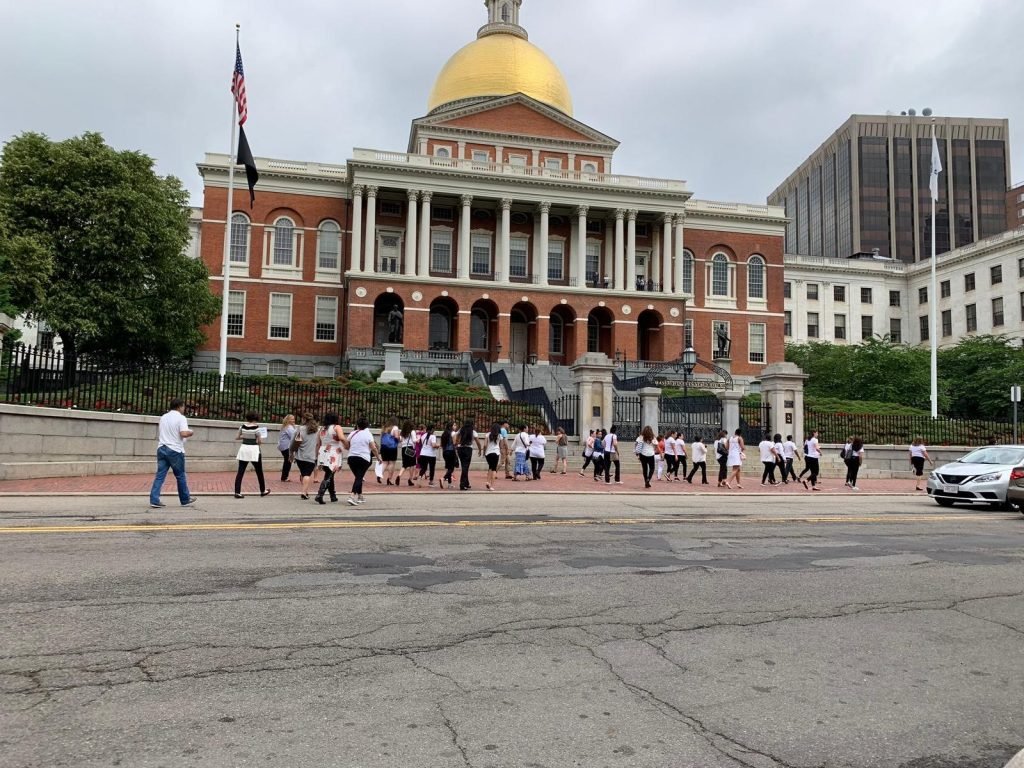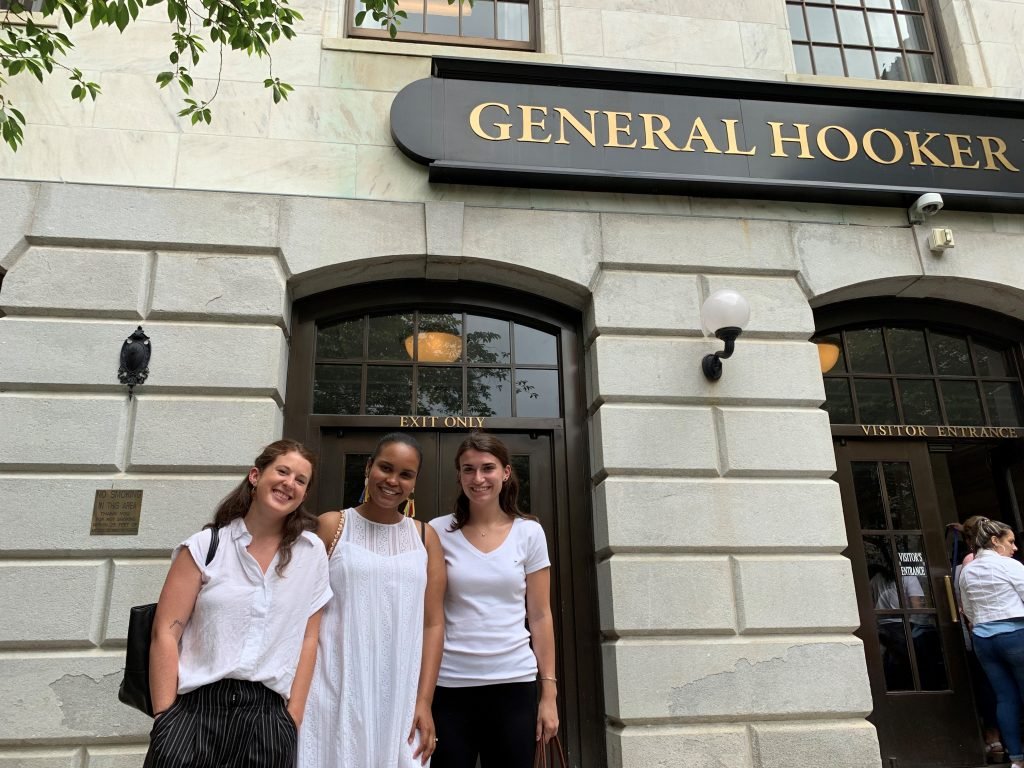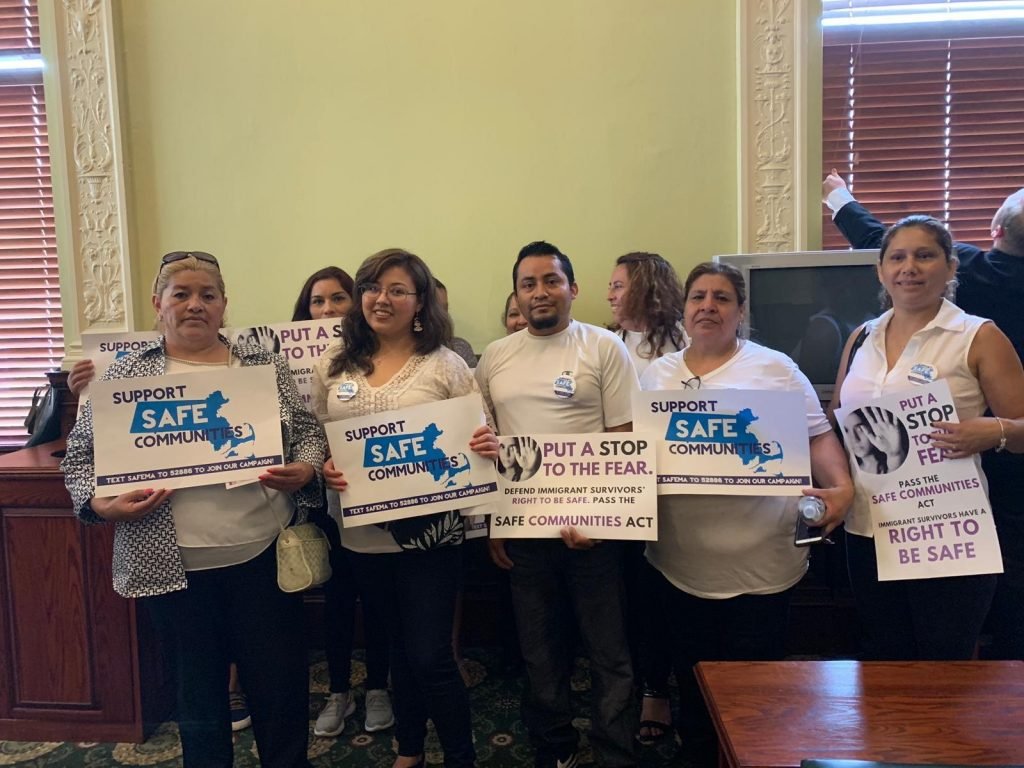By Ally Slocum, REACH Intern

The Massachusetts State House is impossible to miss on Beacon Hill- it’s huge, elevated on a hill and boasts a golden dome. The State House is open for visitors – individuals can take tours, explore or even speak with a representative. Yet, despite its open-door policy, going to the State House to speak with a representative is a lot like the physical appearance of the building: inviting, but also pretty daunting. Entering the State House can be nerve-wracking for anyone, but imagine the added layer of being a survivor of domestic or sexual violence whose voice has been silenced time and time again. Imagine also being an undocumented immigrant who has been conditioned to fear law enforcement. Both of these factors complicate an already intimidating situation, and for many people, would be more than enough reason to not even step foot in the State House. Yet, in a show of true strength and unity, forty undocumented immigrant survivors dressed in white tops and black pants did step foot in the State House on the morning of Wednesday, June 26, 2019.

On this morning, undocumented immigrant survivors of domestic and/or sexual violence, along with representatives from REACH Beyond Domestic Violence, Jane Doe, Inc. (JDI), the Massachusetts Immigration and Refugee Advocacy Coalition (MIRA), and Greater Boston Legal Services (GBLS) convened at the State House to lobby for the Safe Communities Act. This act, cosponsored by Representatives Liz Miranda and Ruth Balser in the House and Senator Jamie Eldridge in the Senate, is designed to promote safe communities by limiting the capacity of state law enforcement agencies to act as federal Immigration and Customs Enforcement (ICE) agents. The Act enforces the idea that the police are meant to protect all individuals, regardless of immigration status, and proposes key changes to current legislation that will drastically improve the relationship between undocumented community members and police officials.
Those who work within the field of domestic and sexual violence have an acute understanding of just how impactful the proposed changes would be on the community. Given the current political climate, undocumented immigrants are particularly hesitant about utilizing the police, as many believe that calling the police will result in deportation. Instilling this fear in their partners is also a common tactic that abusers use to gain and maintain power and control. Passing the Safe Communities Act would be a crucial first step in eliminating this intense fear of the police among undocumented survivors of domestic and sexual violence. Recognizing the importance of the Safe Communities Act, a lobbying day and press conference at the State House was organized with the Latinas Know Your Rights program (LKYR). During the press conference, many individuals spoke, including three survivors, showcasing immense courage: Zoila Lopez, Maria Theresa Rodriguez, and Sandy Rodriguez. Recounting stories of past abuse takes an exceptional amount of strength, and doing so in a room filled with legislators and media personnel as an undocumented immigrant makes this feat even more challenging. “Today is going to be historic,” said REACH’s Gladys Ortiz, one of the organizers behind the lobbying day. “Not just because there’s victims of domestic and sexual violence, but because there are undocumented immigrants here who are afraid.” Their willingness to speak out under such difficult circumstances goes to show just how passionate these women are and just how important it is to pass this act. Representative Liz Miranda also spoke regarding her personal experiences as a survivor of domestic violence and the daughter of immigrants. There was something extremely unifying about the day – here were women on both sides of the legislative process who had experienced the same thing. Each speaker came from a different background and told a different story, yet they all spoke with the same intent: to help other people experiencing similar situations.

Following the press conference, the survivors and advocates split up into smaller groups to visit the offices of various legislators and speak with them regarding the Safe Communities Act. This was my first time at the State House and I was struck by just how simple the lobbying process was- all you had to do was walk into a legislator’s office and ask to speak with them. My day at the State House opened my eyes to just how impactful a single person’s voice can be. Given the political climate of the past few years, I frequently find myself feeling very small- we live in a world with billions of people, and our country is faced with complicated challenges on a daily basis. Some days, I feel discouraged, wondering to myself how someone so seemingly inconsequential could possibly make a dent in tackling some of these huge issues. As part of our lobbying efforts, we spoke with one woman about the importance of lobbying and making our voices heard. She explained to us just how impactful one voice can be, telling us that when one person calls regarding an act, the staff might do some research on it and give it a little bit of attention- but when a second person calls regarding that same act, it brings that act into a different category. They think to themselves, ‘this act must be important, we should learn more about this.’ Two calls- that’s all it takes to really bring an act to the attention of a legislator. She encouraged us to call our legislators, as this is a great way to make sure the act is on their radar screens. I suddenly felt a lot less small as I came to the realization that something as simple as a phone call could actually make a difference.
At the end of the day, many of the survivors spoke about how empowering the experience of lobbying was for them. Many immigrants experience a lot of frustration because they are unable to vote and are extremely limited in their ability to participate in the government and politics. This was an opportunity for many of them to make their voices heard and to advocate for something of great importance to them. I was pleased when they were encouraged to call their legislators- this was another concrete way that undocumented immigrants could have their voices heard and make their opinions count.

Throughout the day, Gladys Ortiz from REACH repeated a sentiment with each of the survivors: “esta es tu casa,” or “this is your house.” This rang true in a few different ways. In a very literal sense, the statement clarifies that the State House and its legislators are meant to represent all people in Massachusetts, and undocumented immigrants are no exception. Undocumented immigrants should feel equally qualified and deserving of voicing their opinions with state officials and lobbying is a great way of doing so. I also felt Gladys’ sentiment represented the bigger picture behind the lobbying day: law enforcement personnel are tasked with protecting individuals and promoting safety within communities, and again, undocumented individuals are no exception to this. The United States is home to undocumented immigrants, too- this is your house, and you deserve to feel safe here.
The Safe Communities Act is a critical act that needs to be passed. All individuals have the right to be safe, and police protection should be a right, not a privilege. My big takeaway from my day at the State House was that my voice matters- and yours does, too. I urge all of you reading this blog post to give your representatives at the State House a call and make sure that the Safe Communities Act is given the attention that it deserves.





